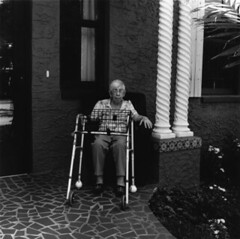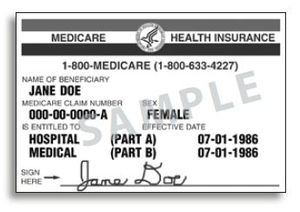My mom was in her 50s when we first looked into hiring a home health aide to help her around the house. Unlike the typical elderly or senior person most home attendants are called to care for, mom was still pretty young, in her 50s then. But she was now blind after a surgery didn’t go as we hoped.
In many ways a home attendant was a good solution since my brothers and I no longer lived at home. I didn’t even live in the same state. But mom needed someone to come into her home to help prepare meals, daily medications and do laundry and light cleaning. We were also told that the home aide or certified nurses aide (CNA) could even help with bathing and personal errands.
Even after knowing this, it still wasn’t an easy decision. After all we were talking about letting a stranger into my mom’s home when we weren’t there and she could not see. I also worried that the agency might send a different aide every week, leaving her even more vulnerable to strangers.

A nurse helps a woman with her exercises in her home kitchen during a home health care visit. Photo courtesy of Getty Images.
In the more than 15 years my mom has had a home health attendant, we have a broad range of experiences and they haven’t always been pleasant. Some aides have stolen from my mothers. Some didn’t come to work on time or at all. Some aides sat around much of the day doing next to nothing and watching television. Some ate more of my mom’s food than she did. Needless to say that they didn’t last long in the job.
But in fairness, we have had several regularly scheduled home aides who came to work on time and did what was expected. We’ve even consider some to be family, including one home aide who helped my mother recover from an accident. Over several months he made sure she did exercises daily to regain the strength in her legs and arms. Like a baby taking a few steps without knowing it, we watched her “walk the walker” when she was in a hurry to get somewhere.
The hardest thing about having a good relationship with a home health aide is remembering that it is a professional relationship. If a home attendant doesn’t do what he or she was hired to do, I have to be willing to respectfully remind them. If that doesn’t work, I contact the referral agency and ask for another home attendant.
Some aides may be happy to leave, but many will not if he or she still wants the work because they don’t know if they will get another assignment with similar hours or within the areas they prefer to work.
That said, I don’t treat our home aide like a personal slave or housekeeper. I recognize that taking care of my mother is her only responsibility when she is in my home. I also realized a long time ago that without a trustworthy aide to help take care of my mom her personal needs would not be met and I could not work and do the other things I need to.










